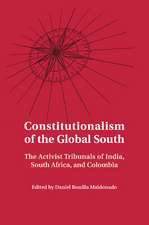The DNA of Constitutional Justice in Latin America: Politics, Governance, and Judicial Design: Comparative Constitutional Law and Policy
Autor Daniel M. Brinks, Abby Blassen Limba Engleză Paperback – 7 aug 2019
| Toate formatele și edițiile | Preț | Express |
|---|---|---|
| Paperback (1) | 238.11 lei 22-36 zile | +16.57 lei 5-11 zile |
| Cambridge University Press – 7 aug 2019 | 238.11 lei 22-36 zile | +16.57 lei 5-11 zile |
| Hardback (1) | 724.77 lei 43-57 zile | |
| Cambridge University Press – 18 apr 2018 | 724.77 lei 43-57 zile |
Din seria Comparative Constitutional Law and Policy
-
 Preț: 206.77 lei
Preț: 206.77 lei - 14%
 Preț: 739.13 lei
Preț: 739.13 lei - 9%
 Preț: 696.09 lei
Preț: 696.09 lei -
 Preț: 439.01 lei
Preț: 439.01 lei -
 Preț: 280.48 lei
Preț: 280.48 lei -
 Preț: 206.84 lei
Preț: 206.84 lei -
 Preț: 367.67 lei
Preț: 367.67 lei -
 Preț: 236.43 lei
Preț: 236.43 lei - 9%
 Preț: 660.82 lei
Preț: 660.82 lei -
 Preț: 178.97 lei
Preț: 178.97 lei -
 Preț: 293.64 lei
Preț: 293.64 lei -
 Preț: 289.73 lei
Preț: 289.73 lei -
 Preț: 238.36 lei
Preț: 238.36 lei -
 Preț: 177.71 lei
Preț: 177.71 lei -
 Preț: 201.18 lei
Preț: 201.18 lei - 9%
 Preț: 695.78 lei
Preț: 695.78 lei -
 Preț: 319.99 lei
Preț: 319.99 lei -
 Preț: 248.39 lei
Preț: 248.39 lei -
 Preț: 358.66 lei
Preț: 358.66 lei -
 Preț: 283.03 lei
Preț: 283.03 lei -
 Preț: 358.48 lei
Preț: 358.48 lei - 14%
 Preț: 742.60 lei
Preț: 742.60 lei - 14%
 Preț: 727.91 lei
Preț: 727.91 lei - 23%
 Preț: 635.44 lei
Preț: 635.44 lei - 14%
 Preț: 721.78 lei
Preț: 721.78 lei -
 Preț: 283.25 lei
Preț: 283.25 lei -
 Preț: 267.18 lei
Preț: 267.18 lei -
 Preț: 284.56 lei
Preț: 284.56 lei -
 Preț: 321.31 lei
Preț: 321.31 lei -
 Preț: 385.61 lei
Preț: 385.61 lei - 14%
 Preț: 723.27 lei
Preț: 723.27 lei -
 Preț: 322.29 lei
Preț: 322.29 lei -
 Preț: 286.89 lei
Preț: 286.89 lei -
 Preț: 356.75 lei
Preț: 356.75 lei - 23%
 Preț: 701.70 lei
Preț: 701.70 lei -
 Preț: 358.48 lei
Preț: 358.48 lei
Preț: 238.11 lei
Nou
Puncte Express: 357
Preț estimativ în valută:
45.56€ • 47.70$ • 37.70£
45.56€ • 47.70$ • 37.70£
Carte disponibilă
Livrare economică 17-31 martie
Livrare express 28 februarie-06 martie pentru 26.56 lei
Preluare comenzi: 021 569.72.76
Specificații
ISBN-13: 9781316630914
ISBN-10: 1316630919
Pagini: 280
Ilustrații: 21 b/w illus. 12 tables
Dimensiuni: 170 x 245 x 15 mm
Greutate: 0.43 kg
Editura: Cambridge University Press
Colecția Cambridge University Press
Seria Comparative Constitutional Law and Policy
Locul publicării:New York, United States
ISBN-10: 1316630919
Pagini: 280
Ilustrații: 21 b/w illus. 12 tables
Dimensiuni: 170 x 245 x 15 mm
Greutate: 0.43 kg
Editura: Cambridge University Press
Colecția Cambridge University Press
Seria Comparative Constitutional Law and Policy
Locul publicării:New York, United States
Cuprins
1. Constitutional justice in the Americas at the turn of the Millennium; 2. Judicial power and the design of constitutional justice; 3. The political origins of powerful constitutional courts: constitutional governance and the politics of judicial design; 4. Identifying the political origins of constitutional justice through quantitative analysis; 5. Guatemala (1985): building constitutional justice in the shadow of Civil War; 6. Argentina (1994): negotiating a plural space of constitutional justice; 7. Bolivia (2009): governance logic in the new constitutionalism; 8. Conclusion: the politics of constitutional justice; Appendix A. Judicial power: concepts and measures.
Recenzii
'For some thirty years now, constitutional politics in general and, more specifically, the performance of higher courts, have become topics of primary public importance in Latin America. In spite of this, however, until now we did not have a critical and systematic study of these issues. Daniel M. Brinks and Abby Blass's book not only fills this void, but it does so on the basis of magnificent empirical work, and offering theoretical reflections on the subject that place this work in the vanguard of existing analyses of constitutional politics.' Roberto Gargarella, Universidad Torcuato Di Tella, Buenos Aires
'Daniel M. Brinks is one of the world's leading scholars of judicial politics in the Global South. In The DNA of Constitutional Justice in Latin America, he and Abby Blass offer an innovative and compelling account of the origins of different models of constitutional justice in Latin America since the 1970s. They explain why some justice systems are much more autonomous in relation to the executive than others, and why some have constitutionalized a much wider range of issues than others. The DNA of Constitutional Justice in Latin America offers important conceptual, theoretical, and empirical contributions.' Scott Mainwaring, Jorge Paulo Lemann Professor for Brazil Studies, Harvard Kennedy School of Government
'The increasing political importance of courts and constitutional justice, raises urgent questions about the nature of judicial power. Brinks and Blass offer fresh insights by skilfully combining legal analysis with institutional theory and political economy perspectives on constitution-making - literatures that otherwise rarely speak. They show why we need to pay careful attention to 'the DNA of constitutional governance' - the institutional design inscribed in the constitutional text, that establishes the judges' autonomy and scope of authority - and to the power dynamics and motives that gave rise to these provisions and the coalitions that sustain them. With a rare combination of conceptual innovation, theoretical sophistication, rigorous quantitative analysis, and fine-grained case studies, the book is highly relevant for all scholars and students interested in constitutional governance. It is invaluable for anyone who care about constitutional politics and governance in Latin America - and is a model for similar studies elsewhere.' Siri Gloppen, Universitetet i Bergen, Norway and Research Director, Chr. Michelsen Institute (CMI), Norway
'Daniel M. Brinks is one of the world's leading scholars of judicial politics in the Global South. In The DNA of Constitutional Justice in Latin America, he and Abby Blass offer an innovative and compelling account of the origins of different models of constitutional justice in Latin America since the 1970s. They explain why some justice systems are much more autonomous in relation to the executive than others, and why some have constitutionalized a much wider range of issues than others. The DNA of Constitutional Justice in Latin America offers important conceptual, theoretical, and empirical contributions.' Scott Mainwaring, Jorge Paulo Lemann Professor for Brazil Studies, Harvard Kennedy School of Government
'The increasing political importance of courts and constitutional justice, raises urgent questions about the nature of judicial power. Brinks and Blass offer fresh insights by skilfully combining legal analysis with institutional theory and political economy perspectives on constitution-making - literatures that otherwise rarely speak. They show why we need to pay careful attention to 'the DNA of constitutional governance' - the institutional design inscribed in the constitutional text, that establishes the judges' autonomy and scope of authority - and to the power dynamics and motives that gave rise to these provisions and the coalitions that sustain them. With a rare combination of conceptual innovation, theoretical sophistication, rigorous quantitative analysis, and fine-grained case studies, the book is highly relevant for all scholars and students interested in constitutional governance. It is invaluable for anyone who care about constitutional politics and governance in Latin America - and is a model for similar studies elsewhere.' Siri Gloppen, Universitetet i Bergen, Norway and Research Director, Chr. Michelsen Institute (CMI), Norway
Notă biografică
Descriere
Analyzes the political roots of the systems of constitutional justice in Latin America, tracing their development over the last 40 years.















